The following is an overview of events in 1983 in film, including the highest-grossing films, award ceremonies and festivals, a list of films released and notable deaths.
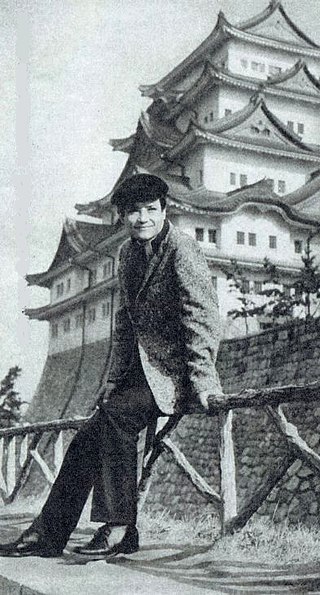
Akinobu Ogata, better known by his stage name Ken Ogata, was a Japanese actor. He appeared in more than 50 movies and 25 television series. For his merits and contribution to arts in 2000 received Japan's Medal of Honor with Purple Ribbon.
Mitsuko Baisho is a Japanese actress whose most internationally known work has been for director Shohei Imamura, from 1979 up to the director's final film in 2010. Baisho has also appeared in films directed by Akira Kurosawa. She won awards for best actress at the 10th Hochi Film Award for Love Letter and Ikiteru Uchi ga Hana nano yo Shindara Sore made yo to Sengen. She also won the award for best supporting actress at the 8th Hochi Film Award for The Geisha and at the 22nd Hochi Film Award for Tokyo Lullaby.

The Ballad of Narayama is a 1958 Japanese historical drama film directed by Keisuke Kinoshita. It is based on the 1956 novella of the same name by Shichirō Fukazawa. The film explores the legendary practice of ubasute, in which elderly people were carried to a mountain and abandoned to die.
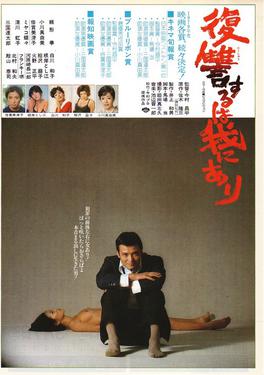
Vengeance Is Mine is a 1979 Japanese film directed by Shōhei Imamura, based on the book of the same name by Ryūzō Saki. It depicts the true story of serial killer Akira Nishiguchi, changing the protagonist's name to Iwao Enokizu.
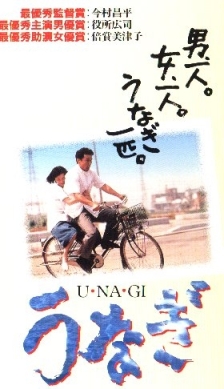
The Eel is a 1997 film directed by Shohei Imamura and starring Kōji Yakusho, Misa Shimizu, Mitsuko Baisho, and Akira Emoto. The film is loosely based on the novel On Parole by celebrated author Akira Yoshimura, combined with elements from the director's 1966 film The Pornographers. It shared the Palme d'Or at the 1997 Cannes Film Festival with Taste of Cherry. It also won the 1998 Kinema Junpo Award for Best Film of the Year.
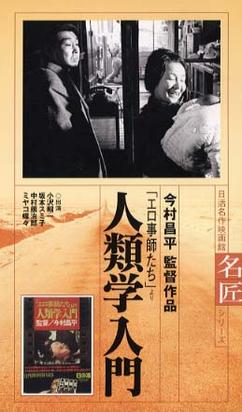
The Pornographers is a 1966 satiric Japanese film directed by Shōhei Imamura. It is based on the novel Erogotoshitachi by Akiyuki Nosaka.

The Insect Woman is a 1963 Japanese drama film directed by Shōhei Imamura. It was entered into the 14th Berlin International Film Festival, where Sachiko Hidari won the Silver Bear for Best Actress award. It was also awarded numerous national film prizes.

Ubasute is a mythical practice of senicide in Japan, whereby an infirm or elderly relative was carried to a mountain, or some other remote, desolate place, and left there to die. Kunio Yanagita concluded that the ubasute folklore comes from India’s Buddhist mythology. According to the Kodansha Illustrated Encyclopedia of Japan, ubasute "is the subject of legend, but…does not seem ever to have been a common custom."
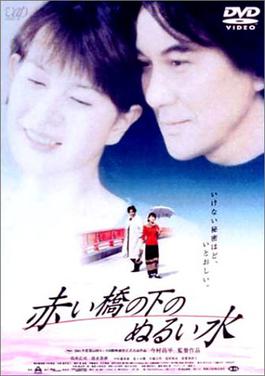
Warm Water Under a Red Bridge is a 2001 Japanese romantic comedy film by director Shōhei Imamura. This was Imamura's last feature film. It was entered into the 2001 Cannes Film Festival. Warm Water Under A Red Bridge focuses on the troubles of a Japanese "everyman" who finds a new life with an unusual woman in a small fishing village. Imamura's last film contains considerable commentary on the search for happiness.

Pigs and Battleships is a 1961 Japanese satirical comedy film by director Shōhei Imamura. The film depicts black market trades between the U.S. military and the local underworld at Yokosuka.

Unholy Desirea.k.a.Intentions of Murder is a 1964 Japanese drama film by director Shōhei Imamura.
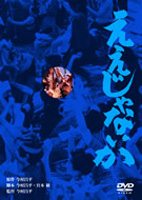
Eejanaika or Why Not? is a 1981 Japanese film by director Shohei Imamura. It was screened in the Un Certain Regard section at the 1981 Cannes Film Festival.
My Second Brother is a 1959 Japanese drama film by Shōhei Imamura. The screenplay is based on the diary of ten-year-old zainichi Sueko Yasumoto, which became a bestseller upon publication.
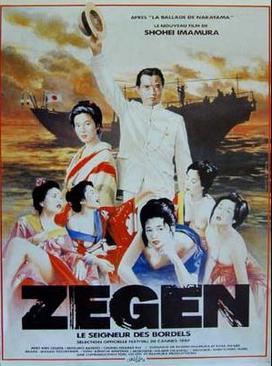
Zegen is a 1987 Japanese black comedy film by director Shohei Imamura. It was entered into the 1987 Cannes Film Festival. The film was selected as the Japanese entry for the Best Foreign Language Film at the 60th Academy Awards, but was not accepted as a nominee.
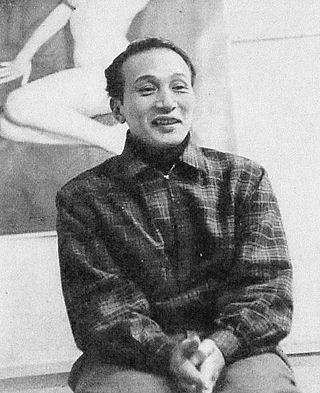
Shichirō Fukazawa was a Japanese author and guitarist whose 1960 short story Fūryū mutan caused a nationwide uproar and led to an attempt by an ultranationalist to assassinate the president of the magazine that published it.
Goryeojang (Korean: 고려장) is a 1963 South Korean drama film edited, written, produced and directed by Kim Ki-young.

Sumiko Sakamoto was a Japanese singer and award-winning actress, born in Osaka, whose heartfelt performances made her a favorite of the late film director Shohei Imamura. Imamura cast her in three of his films: The Pornographers, Warm Water Under a Red Bridge, and The Ballad of Narayama, winner of the Palme d'Or at the 1983 Cannes Film Festival. She won the award for Japanese Best Actress from Nihon Academy for her performance in The Ballad of Narayama, as well as a kiss from Orson Welles.

The 36th Cannes Film Festival was held from 7 to 19 May 1983. The Palme d'Or went to the Narayama Bushiko by Shōhei Imamura.

Shōichi Ozawa was a Japanese actor, radio host, singer, and prominent researcher and expert on Japanese folk art. He also founded the Shabondama-za theater company.
















